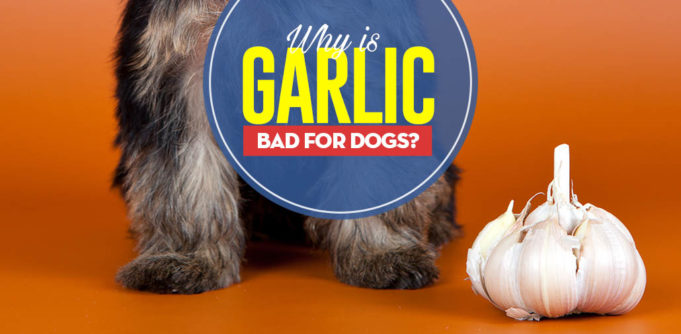The garlic plant has been used to add flavor to foods and for its medicinal purposes for hundreds of years. This edible bulb can flavor a wide variety of foods, from pizza to soups to steaks and burgers. It has also been widely studied for its possible health implications, including regulating blood pressure and reducing the risk of certain cancers. But can dogs eat garlic in any circumstance, and why is garlic bad for dogs?
If you've been wondering, “can I give my dog garlic,” the answer is NO – garlic for dogs in unsafe and toxic due to compound allicin that is prevalent in all allium family vegetables. Regardless of garlic's potential medicinal properties, there is currently no way to safely feed garlic for dogs but it's less toxic than onions.
In this article we'll discuss garlic in more detail, its potential health benefits, can dogs eat garlic in some specific circumstance, why is garlic bad for dogs and more.
ALSO READ: Why Is Chocolate Bad for Dogs?
What is garlic?
Garlic is a vegetable that belongs to the allium family which has been harvested and used by people for centuries. A bulb related to the lily, garlic has long been used as a natural health product worldwide. It is frequently included as a dietary supplement for a range of purposes, from alleviating the common cold to lowering high blood pressure.
This bulb is perhaps best known as a way to flavor food and can be done so in various forms, such as powder, oil, and fresh. The use of garlic is well-documented even in ancient cultures, primarily as a medicinal food to treat many illnesses in people.
This is what garlic looks like:
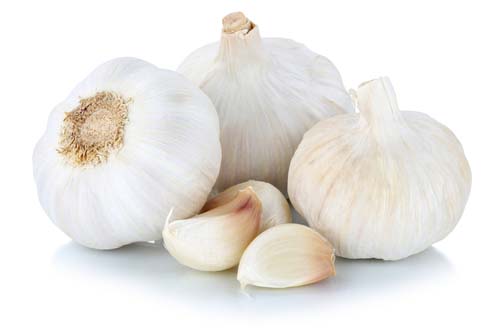
But can dogs eat garlic, is garlic for dogs safe to consume in any circumstance, and if not, then why is garlic bad for dogs and what to do in case your pet has ingested it?
RELATED: 50 Best Homemade Dog Food Recipes
Garlic for Dogs 101
Can Dogs Eat Garlic?
So, can dogs eat garlic in small amounts? Generally, the answer is no – it's best to avoid garlic for dogs based on the current evidence we have. However, whether a dog can eat garlic or not is still a hotly debated argument.
Most of scientific research today shows that large amounts of garlic can be poisonous to dogs, but there is also some arguments (particularly from holistic veterinarians) that garlic may provide important health benefits for dogs. Ultimately, it's best to have a consultation with your veterinarian before feeding any amount of garlic.
Overall, is one of the most well-studied vegetables out there, and a ton of human clinical trials demonstrate its health benefits. Some of this evidence has been the basis among vets for advising garlic for dogs, but we are yet to see any hard proof on the matter. Here is what we currently know about the health benefits of garlic for people:
- Garlic has medicinal properties (1)
- Garlic lowers blood pressure (2, 3)
- Garlic helps to fight off colds and sicknesses (4, 5)
- Garlic lowers the risk of heart diseases (6, 7, 8)
- Garlic may help to detoxify the body (9)
- Garlic helps fight off brain diseases (10, 11)
- Garlic strengthens bones and helps with osteoarthritis (12, 13, 14)
It's easy to see why we should include garlic in our own diet, but can dogs eat garlic in some very small doses? Unfortunately, so far there was no hard evidence showing any safe doses of garlic for dogs, with most research clearly pointing at its toxicity.
Why is garlic bad for dogs and what does science say?
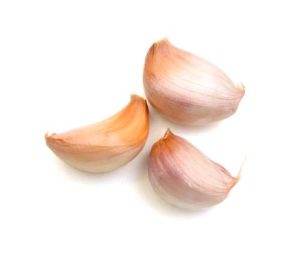 We know that large amounts of garlic are toxic to dogs (Kovalkovicova et al. 2009); however, it's also less toxic than onions. There's also an argument to be made that very small doses of garlic for dogs may be safe, but I'll get to that in a moment. The first question we must ask ourselves is why is garlic bad for dogs and what causes toxicity?
We know that large amounts of garlic are toxic to dogs (Kovalkovicova et al. 2009); however, it's also less toxic than onions. There's also an argument to be made that very small doses of garlic for dogs may be safe, but I'll get to that in a moment. The first question we must ask ourselves is why is garlic bad for dogs and what causes toxicity?
The main suspects in garlic are the active and hypotensive agents ajoene and allicin that are cardiac and smooth muscle relaxants (15, 16, 17). They are said to be the cause of anemia in dogs that ingest garlic. Two studies tested garlic for dogs and whether it actually causes hemolytic anemia in canines (Lee et al. 2000; Yamato et al. 2005). The results of these studies showed a clear correlation between garlic extract and potential for dogs to develop Heinz body hemolytic anemia.
Thus far we're only aware of the potential dangers of garlic for dogs and most veterinarians will encourage to err on the side of caution and stay away from feeding garlic to dogs. If you have dogs at home, remember to about the hidden dangers in the kitchen and puppy-proof your home to avoid poisoning your dog (Gugler et al. 2013).
RELATED: Cashews for Dogs – Good or Bad?
6 Potential Benefits of Garlic for Dogs
 While it's clear from the evidence that we have today that garlic is bad for dogs and toxic to their bodies, potentially causing anemia, there are arguments out there that small amounts of garlic for dogs is safe and beneficial. Note that there is currently no scientific proof to the below claims, but this is how garlic may benefit your canine:
While it's clear from the evidence that we have today that garlic is bad for dogs and toxic to their bodies, potentially causing anemia, there are arguments out there that small amounts of garlic for dogs is safe and beneficial. Note that there is currently no scientific proof to the below claims, but this is how garlic may benefit your canine:
1. Garlic may enhance dog's liver function.
Garlic contains multiple compounds that improve liver function due to their detoxifying effects. Some studies have shown that limiting or preventing the buildup of toxins in the body may reduce the risk of cancer.
2. Garlic may strengthen dog's immune system.
Garlic can be especially beneficial for dogs with weakened immune systems or those who are fighting cancer. Immune function is increased by promoting the activities of cells whose responsibility is to find and destroy invasive cancer cells and microbes.
3. Garlic is a natural flea and tick repellent.
Although the reason why garlic is such an effective repellent is unclear, it has been reported as an excellent source to rid your dog of these parasitic pests. It is particularly useful when combined with brewer’s yeast.
4. Garlic may lower blood cholesterol levels in dogs.
Mixing uncooked garlic into your dog’s food help lower blood cholesterol and triglyceride levels. This benefit is beneficial for dogs suffering from hyperlipidemia, where the level of fats in the blood rises to an undesirable level.
5. Garlic fights a variety of infections.
Whether it’s a viral, bacterial, or fungal infection, garlic can solve the problem. Garlic is both an antibiotic and antimicrobial source. Adding fresh garlic to your dog’s food may ward off mouth, throat, stomach, respiratory, and intestinal infections. Combining olive oil with crushed fresh garlic can be used to alleviate ear mites and ear infections.
Additionally, crushed garlic and oil may also be applied as a topical antiseptic on cuts and wounds for infection prevention.
6. Garlic may be good for a dog’s heart.
Garlic contains compounds that prevent blood clot formation, making it an excellent choice for dogs, and older dogs particularly. It also helps reduce the risk of atherosclerosis, a condition
where plaque develops on the inside of the arteries. If unattended, this situation can lead to cardiac arrest and other cardiovascular health issues.
So, is garlic good for dogs then?
Not necessarily. Again, while some of the benefits of garlic may extent to dogs, we currently do not have any accurate studies showing the exact amount of garlic for dogs that would be safe for them to consume. Theoretically, there may be some great health benefits, but if you choose to err on the side of caution when it comes to garlic and dogs, then zero amount of garlic would be the best way to go.
RELATED: Grape Toxicosis and Dangers Explained
Side Effects of Garlic in Dogs
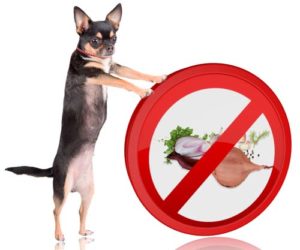 As the above evidence indicates, studies have shown that some dogs can react negatively to large quantities of garlic; other dogs appear to be somewhat immune to small amounts of garlic. There is also reasonable concern based upon research that long-term ingestion of garlic can develop serious health problems in the future for dogs.
As the above evidence indicates, studies have shown that some dogs can react negatively to large quantities of garlic; other dogs appear to be somewhat immune to small amounts of garlic. There is also reasonable concern based upon research that long-term ingestion of garlic can develop serious health problems in the future for dogs.
Short-term side effects and clinical signs of garlic toxicity in dogs can include:
- Gastrointestinal upset, particularly diarrhea, abdominal pain, and vomiting
- Pale gums
- Lethargy
- Breathlessness
- Elevated heart and respiratory rates
- Weakness
- Depression
- Cold sensitivity
- Exercise intolerance
- Discolored urine
The long-term danger associated with garlic is hemolytic anemia. This medical condition is where the body attacks its red blood cells. If left untreated, anemia can be fatal to canines.
Hemolytic anemia caused by garlic toxicity has no antidote. General supportive care, including charcoal ingestion, supplemental oxygen therapy, or blood transfusions, will be necessary to alleviate the anemia.
A dog’s prognosis is entirely dependent on how much garlic was ingested, the severity of the anemia, and the speed at which medical care is initiated.
Additional Warnings About Anemia in Dogs
Garlic should not be fed to dogs categorized as having any of the following conditions:
- pre-existing anemic conditions
- scheduled for surgery
- puppies younger than 6 – 8 weeks of age; puppies don’t begin to produce new red blood cells until after 6 – 8 weeks of age
- lupus or other autoimmune diseases
Summary
Can Dogs Eat Garlic?
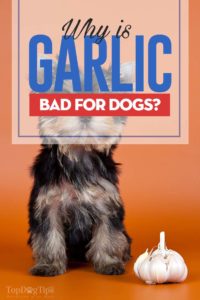 So can dogs eat garlic in small amounts then? If we go by the evidence, there's currently none indicating that any amount of garlic for dogs is safe. Theoretically, depending on the dog, a small amount of garlic may not be dangerous and can even provide some health and nutritional benefits. However, some dogs may be prone to garlic toxicity, even from small amounts, and serious medical conditions like anemia can occur.
So can dogs eat garlic in small amounts then? If we go by the evidence, there's currently none indicating that any amount of garlic for dogs is safe. Theoretically, depending on the dog, a small amount of garlic may not be dangerous and can even provide some health and nutritional benefits. However, some dogs may be prone to garlic toxicity, even from small amounts, and serious medical conditions like anemia can occur.
Why is garlic bad for dogs? The main reason are its two active compounds, ajoene and allicin, which short-term may cause a large list of problems in the dog, and long-term it may cause anemia in dogs, and be potentially fatal.
Whether garlic is right to feed to a dog is up to the owner to decide. But if you do decide to feed garlic to your dog, make sure to discuss this with your veterinarian first.


